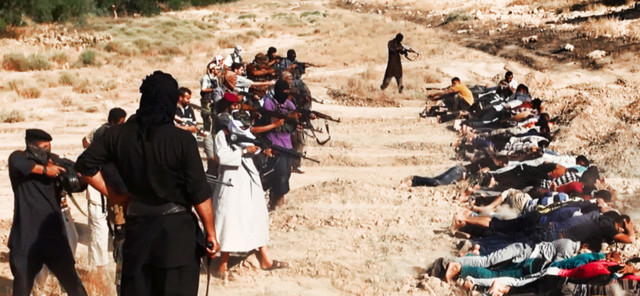
Here is another milestone in the seeming disintegration of our post-Arab Spring world: The elected government in Libya is rendered non-existent, or at best helpless, as militia factions, which had effectively dominated the country since the ouster of Muammar Gaddafi in 2011, have taken control of all ministries in the nation’s capital. These militias, which serve tribal, Islamist or at times simply criminal interests, are now said to have lined up as two coalitions of warring factions, based in Tripoli and Tobruk. The victors on the one side are reported to have gone about attacking and burning down the homes of those accused of backing the other. (Those in Tripoli were not above swarming all over the abandoned American embassy and taking a dip in its swimming pool.) That does not augur well for the future of the North African country.
In Syria, the country’s four million refugees are still refugees and its 200,000 souls killed in the conflict have become almost an abstraction, as if our minds balk at contemplating the unspeakable enormity of it all and we instead prefer (perhaps unconsciously) to invoke Joseph Stalin’s dreadful epigram about how “one death is a tragedy, [while] a million deaths are a statistic”. And Iraq? Well, I have yet to read one insightful piece that would convince me that the country can be stitched back together again.
Palestine and its people are helpless (no other word will do here) at impeding, let alone blocking, Israel’s military and irredentist ambitions in their patrimony. The government in Tunisia, where the Arab Spring was first literally ignited, has been unable to meet the demands of its predominantly young population for jobs and social services. Yemen teeters, with periodic bouts of tribe-against-tribe and tribe-against-government violence.
In the midst of all this, we have those caliphniks from Islamic State of Iraq and the Levant (Isil), whose penchant for destroying religious shrines, terrorising minorities and beheading enemies have triggered widespread revulsion around the world. One such caliphnik, a 33-year-old Australian-born citizen called Khalid Sharouf, several weeks ago posted a photo on Twitter of his son, aged around seven years, whom he had taken to watch an Isil beheading in a Syrian town controlled by the group — holding the severed head of the victim, with the caption, “That’s my boy!”
And yet! Yet, we have to be optimistic about the Arab future. The Arab world is not the only part of the world where a spring of nations erupted, showed promise, faltered and then at the end of it all seemingly succumbed — only to see its revolutionary effusions resurrected, albeit in different form, and finally institutionalised in later years. Consider in that regard the 1848 Spring of Nations in Western Europe (an issue broached several times in this column), a series of political upheavals that swept across Western Europe — upheavals that in hindsight were considered the most widespread revolutionary wave in the continent’s history. Though within a year, reactionary forces regained — or wrested — control of the movements and the revolution sputtered out, the seed had been planted and Western European nations became, well, the dynamic Western European nations we know today.
Rhetoric aside, when a revolutionary movement declines, as that generated by the Arab Spring has done, its energy and instigations are not wholly dispersed. At a subterranean, perhaps teleological level, they in time animate new modes of expression, making available to a later generation a large range of political ideals and moral resources.
The US, putative “leader of the free world” and self-styled purveyor of democracy to the undemocratic, did not itself start out as a democracy. Important elements of democracy may have existed in the infant republic in the 1780s, but the republic was not democratic. Democracy — from demos or ‘rule of the people’ — came later, after the issue of slavery and slavery’s expansion, which led to the Civil War, was dealt with. “American democracy did not rise like the sun at its natural hour in history”, wrote professor Sean Wilentz, director of American Studies at Princeton University, in his iconic work, The Rise of American Democracy. “Its often troubled ascent was the outcome of human conflicts, accommodations and unforeseen events and the results could well have been different than they were.”.
There is hope yet, for people like ours, who bring with them legacies of a great civilisation. And what about that Twitter photo posted by a proud caliphnik father showing his son at a beheading, holding a severed head? Well, darn, I remember when as a child, a parent, going for a bonding father-son outing, took us to watch a football match, not a beheading, and snapped pictures of us with an Eid present given to us — say a shiny, new tricycle, not a severed human head. And, yes, I also remember, as we went on in later years to acquire a maturing consciousness, that we venerated our history because we understood it and embraced our religion because we saw it anchored in a spiritually compassionate vision. We immersed ourselves in the context of the one and the text of the other. It is inevitable, I say, that the imperatives encoded in both will in time reassert themselves on our life and in our world.
Fawaz Turki is a journalist, lecturer and author based in Washington. He is the author of The Disinherited: Journal of a Palestinian Exile.










